by Frances Lasday, Teva, Hazon Parshat Behaalotecha What strikes me most about this week’s parsha, Behaalotecha, is the kvetching. The parsha (Torah portion) spends an entire chapter retelling several instances where the Jewish people complained endlessly. So, what can we learn from this? As an outdoor educator who works with children, and who supervises other educators, I too encounter whining. What interests me most about this parsha are the descriptions of the different ways in which Moshe and G!d react to their cranky people. I think that there is a lot to learn from how Moshe in particular, as leader, caretaker, and educator of the Jewish people, responds to the incessant whining. Before I go any further, full disclosure: I am totally a whiner. I get cranky, and I express it in ways that I am not always proud of. So I get it. I can’t imagine it was easy to wander aimlessly through the desert for 40 years, and there were probably lots of things to be cranky about. But, in Behaalotecha, the Children of Israel’s complaining takes on a whole new level. “The people took to complaining bitterly before Hashem and the Lord heard and was incensed.” […]
Author Archive | Hazon

Sustaining Together: How and why communities are the building blocks of sustainable living
By Aharon Ariel Lavi Somewhere in the early 90’s, when I was in 5th grade, I remember watching a TV show describing what might be the consequences of what was then known as Global Warming and the Ozone Layer Hole. Don’t test me on the details, it was a long time ago, but I do remember the sense of upcoming catastrophe that completely freaked me out and sent me to bed lying ill for three days. On the fourth day, I decided I had to do something about it, so I ran for my school’s “pupils council” and became chair, joined a youth movement, and ended up working mostly on developing intentional communities in Israel. What’s the connection? Well, I ask myself the same question from time to time, wondering if communities are really what we need as the climate system is going off track. True, the dark forecasts of 25 years ago did not come to pass – at least not yet – but experiencing our 5th year of drought in a row here in the Negev (Israel’s Southern desert) does sound like an alarm call to me. Something is changing: we are about to reach 8 billion people […]

Hazon Seal Spotlight: Hadar Chooses Higher Welfare
by Jenny Koshner, Program Coordinator, Hadar Institute Hadar empowers Jews to create and sustain vibrant, practicing, egalitarian communities of Torah, Avodah, and Hesed. They are a Hazon Seal of Sustainability site based in New York, NY. This past year at Hadar has been a transformative year for us. As an educational institution in New York City that empowers Jews of all ages to build and sustain vibrant, practicing, egalitarian communities of Torah, tefillah (prayer), and chesed (service), we have always cared deeply about integrating our lives of study and ritual practice with living according to our tradition’s principles. Since our founding a little over ten years ago, we have integrated our dedication to sustainability, part of our practice of chesed, into our programming and operations. Whether we are purchasing primarily compostable meal-time materials for our immersive programming, or spending an extra thirty minutes when formatting a sourcesheet to reduce the paper we’ll use, or researching biodegradable alternatives to the standard office supplies we purchase, we’ve always striven to incorporate our commitment to sustainability into our programs. This past year, inspired by the commitments of many in our alumni community to fair treatment of animals and responsible-sourcing of food, we’ve made some exciting changes […]
Rise to the Challenge – Every Month!
To start off the secular new year with sustainability in mind, the Hazon Seal launched its first monthly sustainability challenge! Open to everyone, participants are given the opportunity to challenge themselves to bring sustainability into their lives in engaging, creative ways. The monthly challenge demonstrates a range of simple projects to integrate environmental practices and values in individuals’ lives; achievable for sustainability beginners and experts alike! The topics include a range of environmental issues tied to Jewish learning and holidays — for example, January’s challenge encouraged participants to upcycle plastic containers into planters in celebration of Tu b’Shvat, the Jewish New Year for trees, with the aim of reducing waste that piles up in landfills. In addition to being eligible to win fun prizes, like a vintage Hazon t-shirt, reusable Hazon bottles, or delicious jam from the Adamah Farm at Isabella Freedman, participants get a glimpse into how Jewish values and sustainability intersect in their lives. They also then have a platform through which they can share these learnings with those in their social networks and work together to complete the challenges. The outcomes aim to be multi-fold: diverse networks learn about sustainability, sustainability is put into action, and the […]

Hakhel, Heathlands, Jewish Community Farming…and the evolution of “community” in the 21st century
by Nigel Savage Thursday, January 25, 2018 | 9 Shevat 5778 Dear All, I and we struggle to explain what Hazon is and why we do the things we do. Partly this is our fault, and we must try to fix that; we’re working on it at the moment. But partly this is not our fault. The boxes we all use for different categories of contemporary life are faulty, in my view. When people think of “environmental sustainability” they think fairly immediately about any or all of – eg – recycling; composting; solar power; clean tech; climate change; and so on. These are important things, and as an organization, directly or indirectly, we work on them. This month we welcomed another 10 organizations into Hazon’s Seal of Sustainability, taking us now to 60. In Michigan this week 20 clergy, executive directors and layleaders from 12 of our 13 Seal sites came together to share progress and best practice – a phenomenal day. Nearly all have taken major steps towards robust recycling, energy and food projects, plus a number of outdoor environmental projects. Deeply gratifying. Our medium-term goal is to have at least 360 organizations in the Hazon Seal, by the end of […]

Tu b’Shvat is not just for kids
Tu b’Shvat is “the new year for trees.” But, above and beyond the history – the tax year in temple times; the kabbalists in Safed; the JNF; the contemporary Jewish environmental movement – the deeper question is, what can, could, or should Tu b’Shvat mean to me today?

Reb Zalman z”l and the Tree of Life
by Nigel Savage Wednesday, July 9, 2014 | 11 Tammuz 5774 Dear All, As the week goes on, and despite events in Israel and so many other things, I remain profoundly aware of the death of Reb Zalman, may his memory be for a blessing. A sense of him and the memory of him is never far away. He had such a beautiful voice, his beautiful accent, and those twinkly eyes. He was irrepressible, joyous, and a font of ideas and connections. It was a pleasure and a challenge to try to keep up with him and his richly associative mind. His presence continues to echo. I will miss him very much. He was intimately involved with Hazon and our programs over many years. The staff at Isabella Freedman loved him; he made it a habit always to meet with the behind-the-scenes staff, not just front-of-house folk. He taught at Shavuot, was a central figure at Elat Chayyim since its earliest days, was a very special presence at our benefit last year, and came to England with us for a climate change conference a few years back. He was deeply interested in, and supportive of, our work on shmita. And he and […]
The Miracle of Chanukah: A Lesson on Longevity
by Shaked Landor Wondrous as it is, the miracle of Chanukah, in which an oil flask meant to last one day instead lasted eight, seems dwarfed in today’s world of everlasting products: plastic bottles, diapers, aluminum foil, electronics, to name a few. But its essence remains, teaching us the importance of valuing what we have. On the eve of Thanksgiving, I attended an event at John Jay College of Criminal Justice on behalf of Hazon. The college’s Hillel and environmental club teamed up to hold an hour-long “decomposition activity” to shed some light on just one of many environmental issues: waste. I witnessed students and faculty – some perplexed, some intent on finding answers – try to guess the rate of decomposition for a variety of items for the prize of a reusable water bottle or mug. Placed on two long tables were numerous objects: paper towels, banana peels, orange peels, plastic bags, batteries, plastic bottles, diapers, glass containers, electronics, and tin foil (purposely put in order from shortest to longest decomposition rates, unbeknownst to the participants). Some participants intuitively knew that the fruit on the table decomposes – decays or breaks down into simpler matter – faster than, say, […]
Wrestling With Darkness | D’varim HaMakom: The JOFEE Fellows Blog
by Jacob Weiss, Isabella Freedman Jewish Retreat Center, Hazon Parashat Vayishlach This week’s Torah portion — Vayishlach — is jam packed with complex and significant plot lines that the reader can surely glean valuable lessons from. The parsha opens up with Jacob preparing himself and his family for their eventual encounter with his twin brother Esau, who he has not seen in quite a long while. We then read about Shimon and Levi’s attacking of the city of Shechem, followed by Rachel’s passing away, while giving birth to her youngest son Binyamin. I want to further examine the relationship of Jacob and Esau — and how that presents in this week’s parsha — as well as exploring Jacob’s nighttime meeting with the angel. In the first chapter of Vayishlach, Jacob says to God: “Now deliver me from the hand of my brother, from the hand of Esau, for I am afraid of him, lest he come and strike me, and strike a mother and children.” We see here very clearly just how anxious Jacob is in anticipation of encountering his twin brother. Jacob and Esau are the perfect twin foils for one another. Since the time that Jacob came out of Rebecca’s womb clutching onto […]

Why go on a Jewish meditation retreat?
by Rabbi Jay Michaelson Wednesday, December 6, 2017 | 18 Kislev 5778 In large part, the answers are the same as to why one would go on a meditation retreat in general: greater awareness of how we thrive and how we suffer, recharging the mind and heart so we can live more vividly and more compassionately, deep insights that lead to profound shifts in consciousness. But there are plenty of meditation retreats – why a Jewish one? Here are a few answers. First, there’s what some people call the “morphic field”: the community, the sense of connection, and the set of cultural practices, ways of being, and traditions of being Jewish. We’re not a traditionally religious retreat, but for our students, that’s not the point. Rather, they feel more comfortable with the Jewish ‘morphic field’ than with other forms, and feel a sense of connection, tribe, heart-opening, integration, or other positive emotions. It helps set the tone. Second, while the core meditation practices we teach are not indigenously Jewish – more on that in a bit – there is a lot about the retreat that is very Jewish indeed. For one, if we believe that experiences of the sacred are valuable (as opposed […]
“Down To Earth” Judaism | D’varim HaMakom: The JOFEE Fellows Blog
by Darya Watnick, Edlavitch DC JCC, Washington, DC Chayei Sarah This week’s Torah portion is Chayei Sarah, literally “The Life of Sarah.” The title is a bit of a misnomer, as Sarah dies in the second verse. This portion instead focuses on Sarah’s legacy — specifically Abraham and Isaac, those most influenced by her incredible life. It’s a legacy all about family life and connection to tradition – a story that mirrors much of my work here at the DC JCC as a JOFEE Fellow. Here’s what happens in Chayei Sarah, in a nutshell: Sarah dies at age 127 and is buried in the Cave of Machpelah, in Hebron, which Abraham buys from Ephron the Hittite. Abraham then sends his servant Eliezer to find a wife for Isaac. In order to find the right woman, Eliezer devises the “camel test”:when he asks for water at the well, which woman will also offer to give his camels a drink. Rebecca passes the test and returns with Eliezer to Isaac and Abraham. Isaac and Rebecca get married. Then Abraham takes a new wife, Keturah, and has six more sons. Abraham dies at the age of 175 and is buried next to Sarah, as […]

Parashat Vayeira | D’varim HaMakom: The JOFEE Fellows Blog
by Brittany Feldman – Hazon – Detroit, Michigan This week’s Torah Portion, Vayeira, discusses circumcision, birth, destruction, disobedience, and devotion. With so many themes in one portion, I’m choosing to focus on one that stood out to me the most, disobedience. In this particular text, “Abraham pleads with G‑d to spare the wicked city of Sodom. Two of the three disguised angels arrive in the doomed city, where Abraham’s nephew Lot extends his hospitality to them and protects them from the evil intentions of a Sodomite mob. The two guests reveal that they have come to overturn the place, and to save Lot and his family. Lot’s wife turns into a pillar of salt when she disobeys the command not to look back at the burning city as they flee.” I found the last line of this text to be extremely powerful in many ways. For me, it brought up thoughts about destruction and violence- if something bad happens should we choose to just move on with our lives without looking back? Although Lot’s wife disobeyed G-d’s command can her decision be justified? I started thinking about why she would choose to disobey this command. Was it just out of […]
The Ceremony of Innocence
by Nigel Savage November 2, 2017 | 13 Cheshvan 5778 Dear All, I rode into work the day before yesterday, as I do many days of the year, on a beautiful bike path on a beautiful day. Hazon worked quite hard, for several years, to increase the number of protected bike lanes in NYC. We’re proud of that work, and I sometimes say to people, “and the statistics show that protected bike lanes reduce fatalities and injuries, both for bike riders and pedestrians…” But of course those statistics didn’t allow for a day like Tuesday. A few hours after I rode in (and several of the people in our offices rode in, also) a crazy guy (but not randomly crazy; with ideological method to his murderousness) mowed down a bunch of people who happened to be on the path at that moment. As we know, eight of them never got up. I rode home, an hour later, past the police and the barricades and the camera crews. Also two little kids – wee high, three feet tall if that – in cute white Star Wars Stormtrooper outfits. May The Force Be With All Of Us, I thought. Then just a few hours after that […]
Ten New Sites Get the Green Light!
A warm welcome and mazal tov to the Fall 2017 Seal of Sustainability Cohort! We are excited that these 10 new sites – from the east coast, west coast, and in between – are joining the Seal Network on a journey toward sustainability! As part of the Seal of Sustainability, sites will proverbially, and in some cases literally, plant the seeds that will flourish into the institutions’ green visions. Each site leader will form a Green Team that will serve as the organization’s roots to support the three branches – or greening projects – that will be implemented over the course of the certification process. Whether they decide to serve higher-welfare eggs and meat for their Yeshiva program like Mechon Hadar, an educational institution in New York City, or expand their existing composting program to all school buildings, like Allegheny College Hillel aims to do at their Pennsylvania campus, the 10 Fall 2017 sites will commit to three sustainability projects that will have a lasting impact on their institutions. By participating in the Hazon Seal, sites will have the opportunity to transform their institutional food policies, remodel their waste practices, or even re-energize their buildings with solar power! Joining […]
Unique Boulder Collaboration Leads to Big Food Rescue Wins
The juxtaposition of the Jewish community’s commitment to addressing hunger issues and the reality of literal tons of prepared foods being wasted after events was too much for Hazon’s Boulder Director, Becky O’Brien, to handle. She observed that the Jewish community was generous with donating to food drives but it was stumped with how to handle the abundance of delicious perishable foods leftover from events like Shabbat luncheons or bar mitzvah parties. On the donor side of the equation, the Boulder Jewish Community Center (JCC) was eager to be a guinea pig. The JCC’s Event and Rentals Manager Sara Guttman was seeing firsthand how much untouched prepared food was being wasted or composted after major events, everything from crudite trays, to boxed lunches, to expensive cheese platters. While the desire to donate was there, the JCC didn’t have the knowledge or time to research appropriate ways to donate. Sara reflected, “Sustainability is an important priority for the Boulder JCC. We represent this in our new LEED-certified facility, by having a Farm and Sustainability Director, as well as by hosting food drives, and composting. One of the challenges we faced when we moved into our new larger facility in September of 2016 […]



